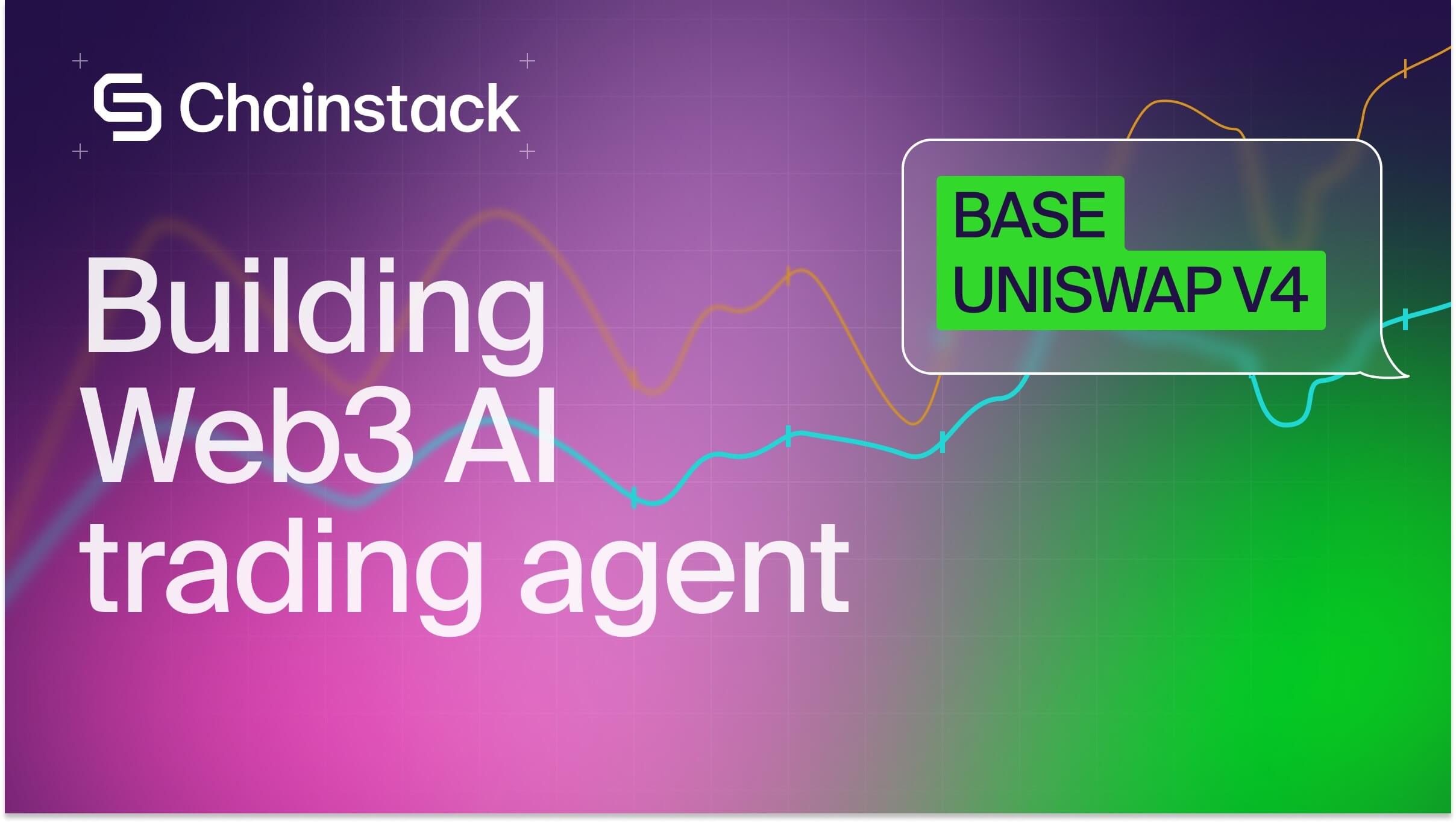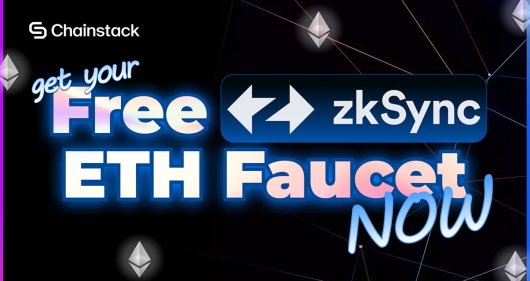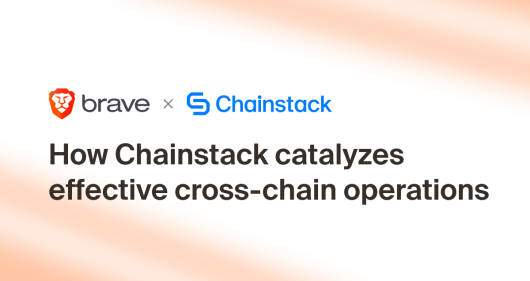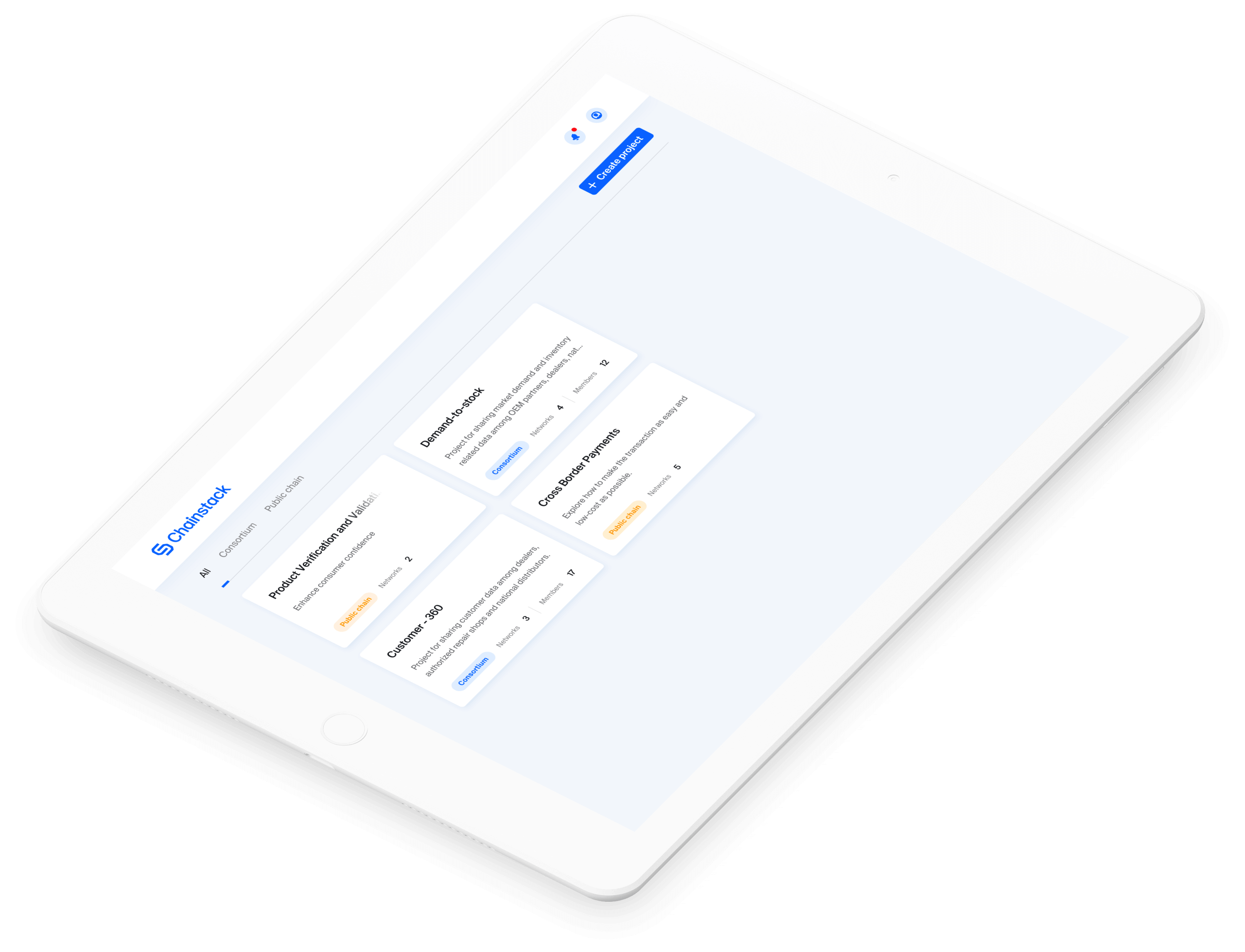From zero to hero: Ethereum DApp developer tools to help you every step of the way

Embarking on the journey of Web3 development might seem daunting at first, but with the right guide and tools, it’s a captivating voyage of discovery. In this digital realm, we primarily deal with a new kind of internet application; we call these Decentralized Applications or simply DApps. Central to the development of these DApps is a key component known as a smart contract.
Smart contracts allow DApps to interact with the blockchain, marking the cornerstone of all dealings on the Web3 platform. These contracts operate on a set of coded rules embedded within them, allowing them to carry out transactions or functions when pre-set criteria are met.
But worry not! As a rookie Web3 developer or hobbyist, you’re not expected to dive straight in. It’s here that the Remix Integrated Development Environment (IDE) comes in. The Remix IDE offers a user-friendly platform where you can learn, practice, create, and test smart contracts for your blockchain projects. It’s like the toolbox you never knew you needed!
An IDE, or Integrated Development Environment, is an application that provides a comprehensive environment for writing, testing, debugging, and deploying code.
Build simply with the Remix IDE
The Remix IDE is a versatile tool for any blockchain enthusiast, acting as a multi-purpose platform that supports the entire flow of smart contract development—from writing to testing, and finally deploying on the Ethereum blockchain. The secret behind its appeal is its user-friendly interface combined with an exhaustive suite of features that cater to both beginners and seasoned developers in the blockchain space.
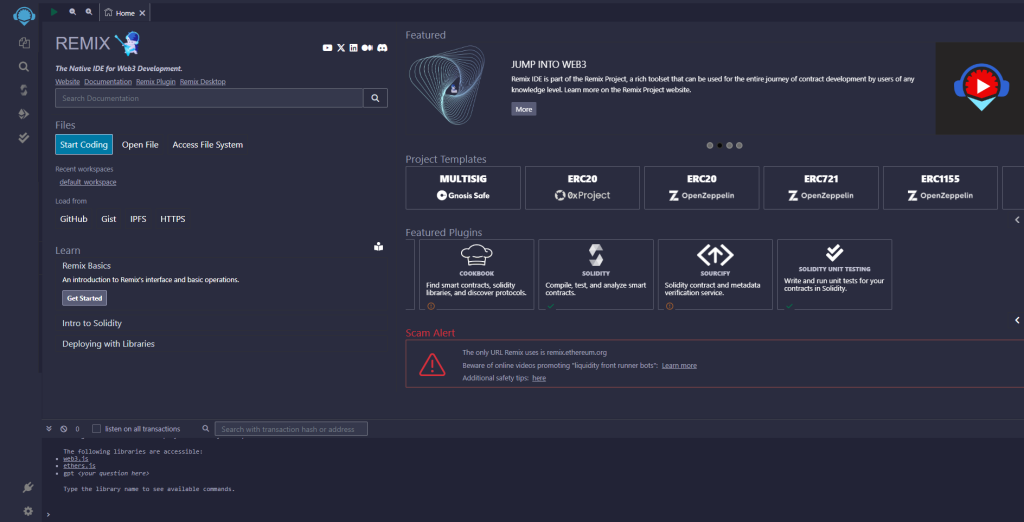
At its core, Remix IDE thrives on simplifying the entire process of smart contract development. The platform offers all the resources for writing smart contracts in the popular Solidity programming language. Moreover, it provides a testing environment to deploy and interact with your contracts, thereby saving you from the intimidating task of setting up a test blockchain.
But hold on, there’s more! Remix IDE boosts efficiency by providing direct access to documentation right inside the platform. This means all the information you need to navigate the blockchain development landscape is available at your fingertips.
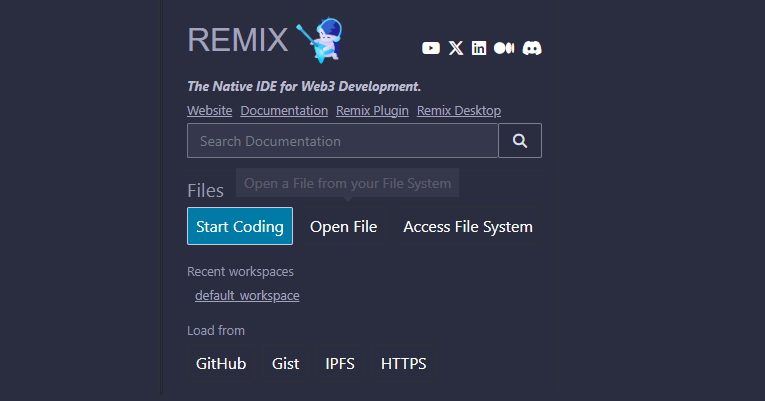
Plus, it offers a range of project templates and plugins. These pre-built components not only reduce the development time significantly but also take away the repetitive tasks, so you can focus on building interesting parts of your blockchain project.
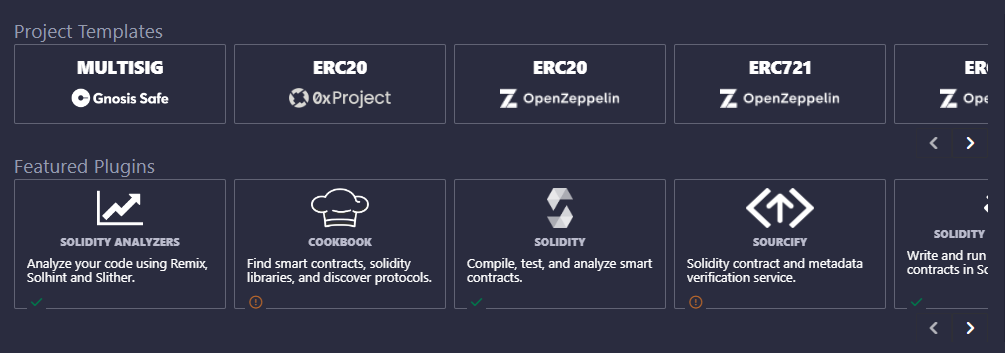
Learn Solidity with Remix
Once you’ve got your feet wet with the basics of Web3 development and explored the Remix IDE, it’s time to take a deeper plunge. A foundational understanding of Solidity programming is central to excelling in smart contract creation. Solidity is a statically typed programming language designed for implementing smart contracts on Ethereum.
Remix IDE supports Solidity programming and serves as an excellent learning ground for developers delving into blockchain projects. It brings your code to life by transforming it into instructions for the Ethereum Virtual Machine (EVM).

Plug in your favorite RPC in Remix
With the solid foundation you have built so far in Web3 development, you are now ready to explore even further. Remix IDE isn’t just about helping you write and deploy smart contracts; it’s about opening up a world of possibilities for you as a blockchain developer.
One of the vital features of Remix IDE is its support for alternative Remote Procedure Call (RPC) providers when deploying and running transactions. What does this mean for you as a developer? Simply put, it expands the range of blockchain networks you can interact with for testing and deployment.

Remote Procedure Call (RPC) providers are a crucial part of blockchain networks, letting applications communicate with blockchain nodes. But, if you’re a rookie developer, you might ask, “What if I don’t have a node?”
Simple! you can deploy a node for free on Chainstack. Chainstack is an intuitive platform for managing Web3 infrastructure like blockchain nodes. It simplifies the process, so even rookies can quickly get their nodes up and running in no time at all.
To deploy your elastic node, head over to our website and create an account. Once logged in, go to your dashboard, create a new project, and select ‘Join network.’ Pick Ethereum, configure your node details, and click ‘Create.’ And within a couple of minutes, you’ll have your node up and running.
Navigate token standards with the OpenZeppelin Wizard
Imagine walking into a digital marketplace where transactions, governance, and more happen seamlessly in a decentralized manner. The key driving force behind this smooth operation? Tokens. Tokens form the backbone of blockchain infrastructure, lending structure, and balance to the unfolding actions. In particular, tokens find importance in EVM-based development, constituting a set of standards known as ERC20, ERC721, and ERC1155.
ERC20 tokens, similar to your everyday currency notes, are fungible—each token is identical to every other token; it’s used widely for swapping digital currencies. Conversely, ERC721 tokens are non-fungible, with each token possessing unique attributes. This uniqueness has exemplary representations in the world of cryptographically unique collectibles—remember CryptoKitties? Then there is ERC1155, a more modern, multipurpose standard, which facilitates a mix of fungible and non-fungible tokens.
Creating tokens with these standards, especially for a newcomer, may appear daunting. Open-source libraries like OpenZeppelin step in right here to make your task significantly more comfortable, providing audited smart contract templates that cover a variety of use cases, including token creation. Interestingly, OpenZeppelin sports a user-friendly Smart Contract Wizard, an interactive tool that lets you create customized token contracts with just a few clicks, sparing you the complexity of code!
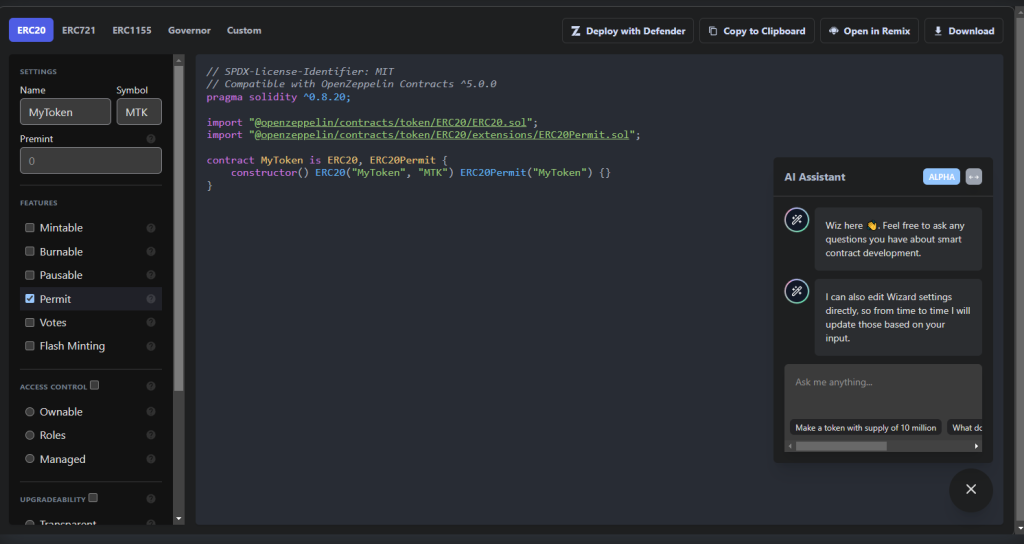
Smart contract example
// SPDX-License-Identifier: MIT
// Compatible with OpenZeppelin Contracts ^5.0.0
pragma solidity ^0.8.20;
import "@openzeppelin/contracts/token/ERC20/ERC20.sol";
import "@openzeppelin/contracts/token/ERC20/extensions/ERC20Burnable.sol";
import "@openzeppelin/contracts/access/Ownable.sol";
/// @title Chainstack ERC20 Token
/// @dev Extends ERC20 Token Standard basic implementation with burnable functionality and ownership.
/// The token is initially owned by the address passed to the constructor, which also receives an initial mint of tokens.
contract Chainstack is ERC20, ERC20Burnable, Ownable {
/// @dev Sets the details for the "Chainstack" token and assigns the initial owner.
/// @param initialOwner Address to be set as the initial owner of the token.
constructor(address initialOwner)
ERC20("Chainstack", "CSK") // Sets the token name and symbol.
Ownable(initialOwner) // Initializes the Ownable contract with the initial owner.
{
// Mint initial token supply to the address deploying the contract.
_mint(msg.sender, 1000000 * 10 ** decimals());
}
/// @notice Allows the owner to mint new tokens to a specified address.
/// @dev Mints `amount` tokens and assigns them to `to`, increasing the total supply.
/// @param to The address that will receive the minted tokens.
/// @param amount The number of tokens to mint.
function mint(address to, uint256 amount) public onlyOwner {
_mint(to, amount);
}
}
Cook Web3 with quick and easy Chainstack Recipes
X has Xstorms. Developers have code snippets, and at Chainstack, we have recipes. Yes, swimming in the vast sea of blockchain development can sometimes leave you feeling lost. This is where Chainstack’s Recipes come in handy, acting as your compass and guide to navigate the array of functionalities available for smart contract development and more.
Chainstack Recipes are essentially chunks of code that provide ready-to-use functionalities for your project. Think ready-made pizza dough, but for code. Whether you’re creating a basic smart contract or interacting with a decentralized oracle, they’ve got a recipe that will save you time and effort.
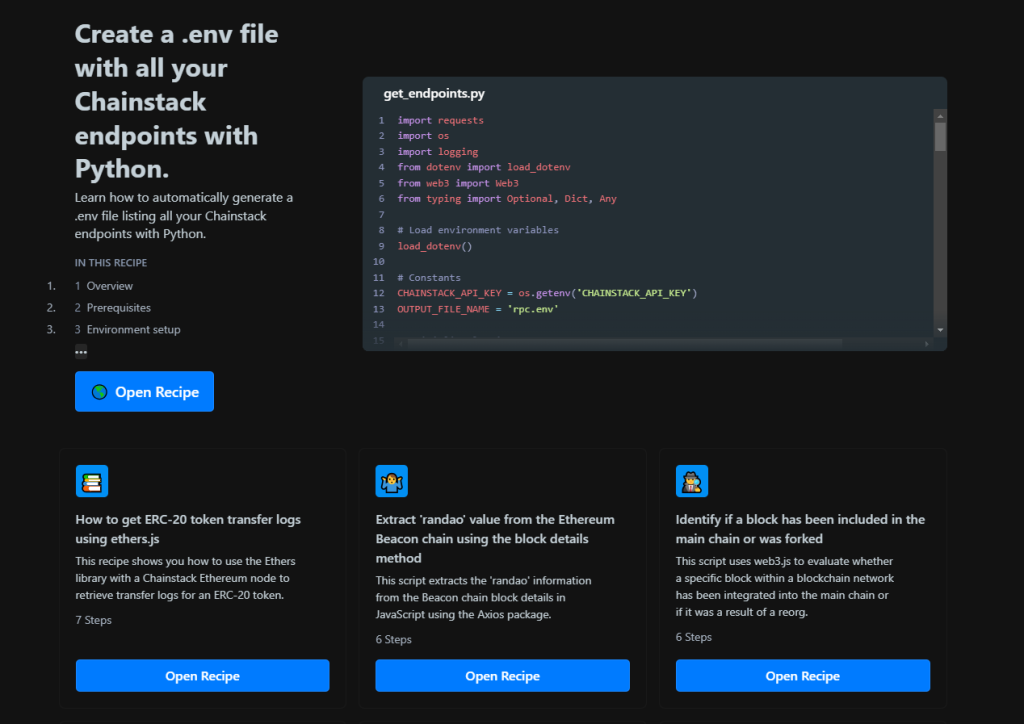
These recipes integrate seamlessly into your project, allowing you to focus on the creative aspects of your DApps, instead of the repetitive bits. They shave hours off your development time, allowing you to bring your blockchain project to life faster. So, let’s dive into them!
Bringing it all together
The realm of Web3 development is expansive and exciting, teeming with endless possibilities. At the heart of this universe is Remix IDE, providing a robust and user-friendly platform that equips developers with the tools they need to excel in the realm of smart contracts and DApps.
From the initial steps of understanding Web3 and its components, diving into the heart of Remix IDE, widening our horizons with Solidity and OpenZeppelin Plugins, exploring alternate RPC providers, and finally getting a taste of Chainstack Recipes, this journey has been a deep dive into the world of blockchain development.
Remix IDE, therefore, can be viewed as more than a tool. It is a beacon for developers, lighting the way towards mastery of Web3. The platform’s strength lies in its innovative approach that combines a comprehensive suite of tools with a simple interface that enables developers at all levels to bring their blockchain vision to life.
As the age of digital democratization continues to unfold, platforms like Remix IDE and Chainstack are destined to be at the forefront, spearheading the movement toward a decentralized future. And with each passing day, the future of Web3 comes more into focus.
No matter where you are in your blockchain journey, remember that your creativity, combined with the right tools, can create remarkable innovations in this dynamic Web3 space. The blockchain revolution is ongoing, and with the help of guides like these, you can navigate it confidently.
After all, in the vast cosmos of Web3, the possibilities are endless, and the exploration is just beginning!
Power-boost your project on Chainstack
- Discover how you can save thousands in infra costs every month with our unbeatable pricing on the most complete Web3 development platform.
- Input your workload and see how affordable Chainstack is compared to other RPC providers.
- Connect to Ethereum, Solana, BNB Smart Chain, Polygon, Arbitrum, Base, Optimism, Avalanche, TON, Ronin, Plasma, Hyperliquid, Scroll, Aptos, Fantom, Cronos, Gnosis Chain, Klaytn, Moonbeam, Celo, Aurora, Oasis Sapphire, Polygon zkEVM, and Bitcoin mainnet or testnets through an interface designed to help you get the job done.
- Fast access to blockchain archive data and gRPC streaming on Solana.
- To learn more about Chainstack, visit our Developer Portal or join our Telegram group.
- Are you in need of testnet tokens? Request some from our faucets. Sepolia faucet, Hoodi faucet, BNB faucet, zkSync faucet, Scroll faucet, Hyperliquid faucet.
Have you already explored what you can achieve with Chainstack? Get started for free today.
 Ethereum
Ethereum Solana
Solana Hyperliquid
Hyperliquid Base
Base BNB Smart Chain
BNB Smart Chain Monad
Monad Aptos
Aptos TRON
TRON Ronin
Ronin zkSync Era
zkSync Era Sonic
Sonic Polygon
Polygon Unichain
Unichain Gnosis Chain
Gnosis Chain Sui
Sui Avalanche Subnets
Avalanche Subnets Polygon CDK
Polygon CDK Starknet Appchains
Starknet Appchains zkSync Hyperchains
zkSync Hyperchains











